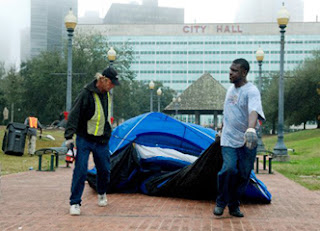
Just 10 days ago, he was one of hundreds who shuffled through the homeless camp that stained the mayor's doorstep. On Friday, he was Ricky Kees, guest in Room 402 of a local hotel, holding a steady job and wearing a fresh change of clothes.
Kees was among the 249 people the group UNITY of New Orleans have placed in hotel rooms over the past month to meet Friday's deadline to fold a homeless encampment in front of New Orleans City Hall. The National Alliance to End Homelessness in Washington, D.C., said the exodus from Duncan Plaza was the first time so many homeless people had been moved from one place without a police action.
Kees, 45, who came from Jackson, Miss., said the estimated 30 people who moved from the encampment back to the street could learn from his example.
''They have to accept the help of others and make an attempt to help themselves,'' he said.
The plaza became a symbol for what some have called a homeless epidemic since Hurricane Katrina. The city has seen its homeless population double to 12,000 since the storm, according to UNITY.
Martha Kegel, executive president of the group, said if police had swept the homeless from Duncan Plaza, the result could have been a standoff like the one across the street at City Hall a day earlier. On Thursday, protesters clashed with police over the city council's unanimous decision to raze four of the city's public housing projects.
Instead, she said, hotel owners who agreed to house the homeless, government bodies who provided funds, and outreach workers who urged mentally ill and troubled people to accept the help, averted any violence.
''Even though many cities across America have serious homelessness problems, no other city in America has moved this many people out of street homelessness, into housing, in so short a period of time,'' Kegel said during a news conference at the plaza.
Still, Kegel said homelessness is so challenging in New Orleans that the group had to make tough choices about who would receive transitional hotel rooms and later low-rent apartments. Most were people who had been assigned UNITY case workers, sometimes even before they landed in the plaza.
''We operated with a closed list,'' Kegel said, explaining that giving help to all takers could have caused many more to come to the plaza and seek it.
Kegel said the group would try to convince those who were not helped to accept a shelter bed and get in the UNITY system, though beds were dramatically reduced by Katrina and many of the homeless find them no better than the street.
By Friday evening, half of the plaza was ringed by chain-link fence to prepare for the planned demolition of adjacent state office buildings. City sanitation crews bagged and carted off piles of debris left behind in a compound that was once considered a safe-haven for the homeless, but lately became filled with trash, danger and despair.
Troy Biggins, 46, was among those who received no help. As he pulled dirty clothing out of tent, he said he lost the identification card needed to qualify for assistance.
''I'm just trying to figure out how I don't end up under the bridge,'' he said, referring to a nearby freeway overpass where some people from the plaza have relocated.
Saturday, December 22, 2007
Group Helps House New Orleans' Homeless
Posted by
rich board
at
10:51 AM
0
comments
![]()
Labels: katrina recovery
Subscribe to:
Comments (Atom)



